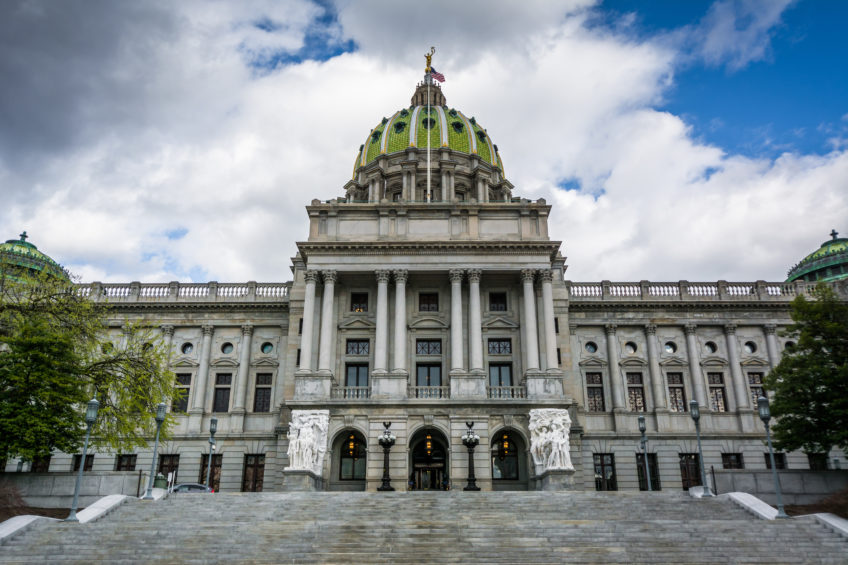Pennsylvania Gov. Wolf’s Calls for Progress with “a Push”
Pennsylvania Gov. Tom Wolf’s Budget Address contained a strong undercurrent of authoritarianism. Progress, as defined by the governor’s dictionary, can sometimes “require a push.” Agenda items within the speech reveal a desire for a more central planning and State control.
One “push” for “progress” likely alluded to by the governor was his attempt to end the 2017 budget battle by issuing a $1.23 billion bond through the state liquor system. Of course, the governor has a history of circumventing the legislative process through unilateral actions, some of which may have violated constitutionally proscribed separation of powers. The governor’s past actions, along with the content of his address, are, to borrow a now-common phrase, “not normal.”
The governor targeted three main policy areas: education, job training and a natural gas extraction severance tax. Importantly, this tax would be imposed on top of the existing impact fee and one of the highest corporate income tax in America. The overarching theme was a call to resolve systemic problems plaguing the state simply by perpetuating the cycle of taxing and spending. Collectively, these proposals neglect to consider how existing state policies may largely be responsible for these existing problems.
According to Gov. Wolf, Pennsylvania’s education system direly needs investment, especially in lower socio-economic status (“SES”) communities. The governor cited enacting a “fair funding formula” that made “sure that your zip code doesn’t determine what kind of education you can get.” While the sentiment is appreciated, more funding is not necessary to remedy the inequities. Increasing average spending per student—a 9th highest $14,717 nationally—is likely beyond the point of diminishing returns. Meaning, additional spending will have little impact, particularly when compared to alternative methods to improving education outcomes. The governor should instead focus on improving state education policy, where Pennsylvania ranks 17th nationally according to the 22nd Report Card on American Education. Competition through school choice is more likely to generate innovations and improvements in K-12 education. Although state academic standards are high, teacher quality and standards have much room for improvement. Likewise, the homeschool regulation burden remains egregious and greater choice is needed related to charter schools and private school programs. This requires the governor and the State to cede control and trust parents.
Gov. Wolf lauded the Department of Community and Economic Development’s workforce training program. But state-driven job training programs have rarely stood up to scrutiny. Federal programs—the most studied—have been the target of well-deserved criticism from the 1980s to present. Certainly, advocates such as Gov. Wolf can point to specific individuals who benefited from the program. However, the copious amount of tax dollars expended for each job “created” or person “trained” illustrates that the state clumsily and inefficiently attempts to predict the needs of producers and desires of consumers.
Rather than engage in this misguided policy, the governor should focus on reducing the costs (such as workers’ compensation and tort liability) and risks of employing low-skilled employees. Making it possible for a business to employ such a person profitably gives actual on-the-job training with useful skills without bureaucratic red tape or taxpayer risk. Again, this would require the governor to trust Pennsylvania workers and employers to voluntarily engage in mutually beneficial transactions.
Finally, Gov. Wolf dredged up his three-year-old argument for a severance tax on natural gas production. As the Commonwealth Foundation explained in 2014, 2015, and 2017, natural gas companies in Pennsylvania already face some of the highest corporate income taxes in the country, severance taxes rarely generate as much revenue as projected, and the state has a spending problem, not a revenue problem. Furthermore, the severance tax states cited by Gov. Wolf as examples to follow are struggling with revenue volatility due to shifts in the energy market. Furthermore, the imposition of a severance tax could make Pennsylvania a less competitive state for energy exploration, development, and extraction capital and jobs. As a result of the sky-high corporate income tax and burdensome regulations, the Keystone State often forfeits an edge to Wyoming, Texas and Alaska.
Pennsylvania ranked 38th in economic outlook the Rich States, Poor States ALEC-Laffer State Economic Competitiveness Index, a ranking system which uses 15 variables associated with economic growth such as top marginal income tax rates, public employment as a percentage of total population, and tax expenditure limits. Policymakers in Pennsylvania can enact reforms on nearly every metric that will increase economic liberty and thus growth. Put simply, trust Pennsylvanians with their money, trust them to help one another, trust them to grow their state. The proposed tax hikes, gushers of spending and jobs market interventionism have not and will not create prosperity.

